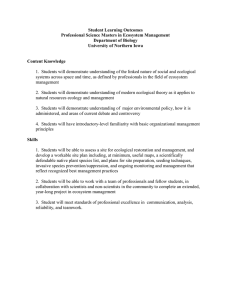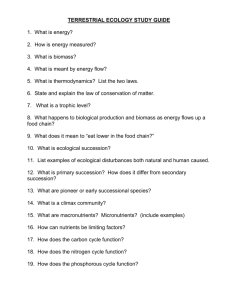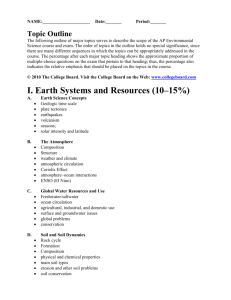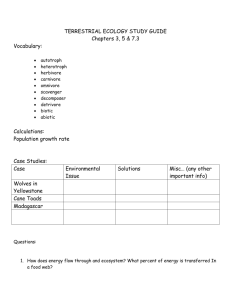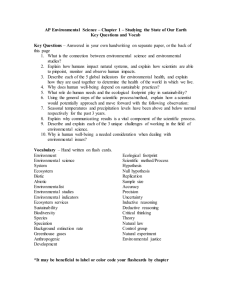COURSEWARE ON ECOLOGY & HEALTH
advertisement
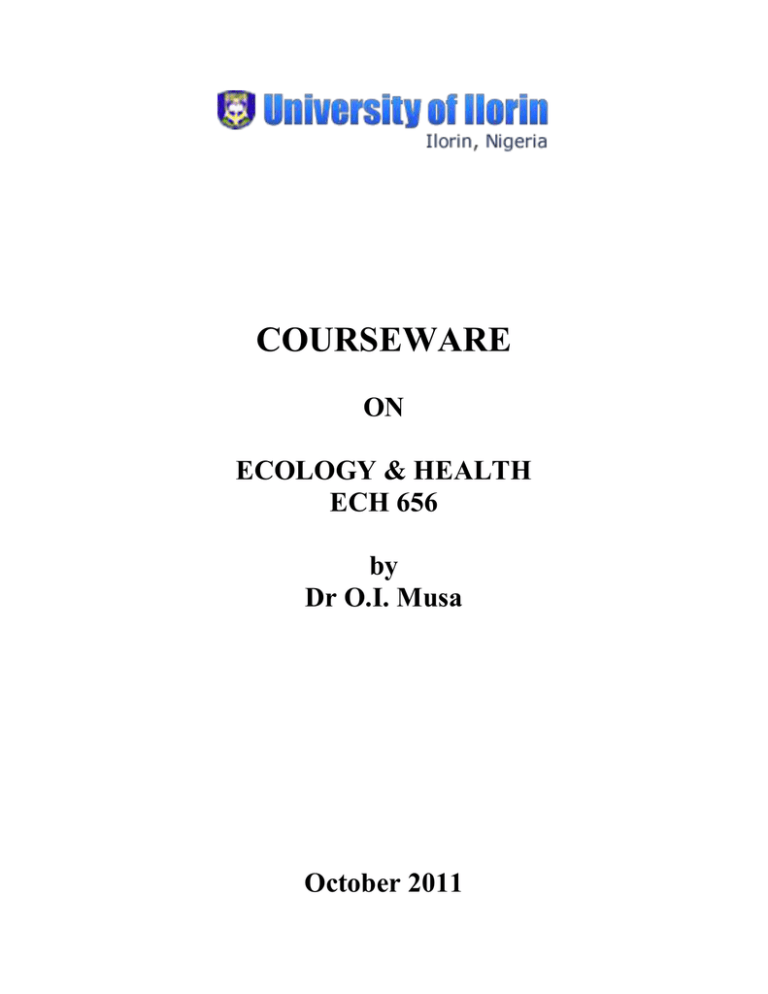
COURSEWARE ON ECOLOGY & HEALTH ECH 656 by Dr O.I. Musa October 2011 Human Environment Human environment: is the general surroundings of man and consist of the physical, biological and social components Physical Environment Non-living component of man’s environment E.g. air, water, food, light, heat, noise, radiation All affects man directly or indirectly Directly – man needs air, water, food to survive Indirectly- light, health, noise, radiation affect man’s health Biological Environment Include all living components of man’s environment, e.g. plants, animals, and micro-organism (virus, bacteria, fungi etc) Existent of this component depends on large extent on the physical environment e.g type of plants/animal depends of vegetable ……..weather, survival on microbes depend on water, temperature etc Social Environment Consist of man –man interactions-social-cultural practices belief, cultures, values Major effect is on the psych-psychological effect i.e mental health social environment affect health positively and negatively Man through his activities, actions and interaction effects changes in the environ which may lead to environmental pollution Environmental Pollution: Is defined as the unfavorable alteration of our surrounding largely resulting from man’s actions leading to creation of environmental stress which may influence man’s health IMPACTS OF MAN ON THE ENVIRONMENT Man is the most important agent of change in the ecosystem Man impact can be deliberate or accidental, also direct or indirect These impact have result because of man activities Impact include:1. Deforestation – farming, fire, timbre, overgrazing Change in Biomass Forest areas have been replaced other variable biomass composed of agricultural crops, grass, scrubs, desert etc Effect of deforestation a) Change in micro-climatic conditions e.g wind spread light conditions, air range, soil temperatures, humidity, average air temperature b) Change in hydrological cycle. i.e circulation of water between the atmosphere, the land and water bodies resulting in ◦ Increase soil wetness and saturation ◦ Increase surface run-off ◦ Flooding/erosion c) Desertification Change soil type-deforestation-fire-farming type Change in biomass – lead to growth of fire resistant ssp Change in ecosystem Change soil type and nutrients Change in inorganic component on soil Agro system – Dam, Irrigation farming, pesticides Man-made ecosystem with dominant effection plants and animals Crop plants Change in pattern of weeds CONDITIONS 3. 4. 5. Competitive with Agric crops Leading to geneloplant of herbicides Pollution –Air, water, land Change in hydrological cycles – decrease water availability Evolutional change – Hybridization ROLE OF MAN IN THE ECOSYSTEM 1. Man as the ecological dominants –Def. ecological dominant why man can exert dominant 2. Man as tool making Animals (why need tools trait for making tools types of tools) 3. Man as robber animals (why chain –competition, non-consumptive use of ecosystem) 4. Man as agents of evolution (hybride, nutifical ecosystem) 5. Man as gent of pollution (air, land, water) 6. Man as animal with substances population growth rate MAN AS ECOLOGICAL DOMINANT Definition: A plant or animal is describe as ecological dominant ◦ if it can compete more successfully than other organisms for the essentials of life (particularly nutrition) in the same habitat or physical environment ◦ it can exert a greater influences in the habitat in which it lives on the other associated living components Example, plant, animal Why man can exert ecological dominant mainly due to their anatomical and mental characteristics Complete upright positive with bipedal locomotion Large and well developed hands and thumbs for fire metien than any other primate mammals Omnivorous characteristics Well developed brain especially cerebrum for thinking Numerous strengths –tram is the most abundant singe spp of large mammals except for other coneramels Man occupied the highest tropic level in the ecosystem i.e. No “predator” Usefulness of Ecologic in Health Population trends and control Understand ecological basis of disease occurrence and control Man affect the environment and vise versa Research and hypothesis Man adaptation to physical environment Challenges for human develop (technology, medical science, socio-economic) Discovery and mobilization of resources Ecological disasters/control
